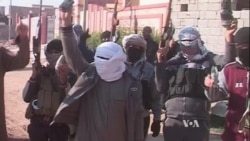U.S. Secretary of State John Kerry is leading diplomatic efforts to build an international coalition against Islamic State militants responsible for killing civilians across Syria and Iraq.
Washington is working to push beyond airstrikes against Islamic State fighters in Iraq to a broader coalition against the Syria-based militants.
Speaking in Estonia on his way to a NATO summit in Wales, President Obama said a coalition to take on Islamic State, also known as ISIS, is complicated by the power vacuum in Syria.
"It is going to take time for us to be able to form the regional coalition that is going to be required so we can reach out to Sunni tribes in some of the areas that ISIS is occupying. And to make sure that we have allies on the ground, in combination with the air strikes we have already conducted. So, the bottom line is this - our objective is clear and that is to degrade and destroy ISIL so it is no longer a threat," said Obama.
Such a coalition will include partners contributing in a variety of ways, says analyst Nora Bensahel of the Center for a New American Security.
"The United States is working very hard right now to try to build a coalition of countries that has like-minded interests about ISIS, to try to strengthen diplomatic efforts against the group, potentially economic efforts, financial sanctions and other things, sharing of intelligence, I'm sure, and potentially even bringing some of those states into a coalition to conduct airstrikes," said Bensahel.
All of which, added she, must be coordinated with Iraqi forces confronting ISIS on the ground.
"Ultimately the only forces that are going to be able to roll back ISIS in any time frame are local forces, and that's why you're seeing efforts to train and advise. That's what the United States is doing," said Bensahel.
Those Iraqi forces will answer to a new government in Baghdad that is backed by Iran, which also opposes the Islamic State.
But Tehran and Washington sharing a common enemy could complicate a broader coalition, said former U.S. ambassador to Iraq Ryan Crocker.
"We’re at an extremely delicate time throughout the region as the Iraqis struggle to form a government that needs to be inclusive enough that it will bring Sunnis back into the process…. I think any overt cooperation between Iran and the United States could create far more problems than it solves," said Crocker.
An active role for Iran also may unsettle Saudi Arabia and Egypt, both important members of a coalition against the Islamic State, says American University professor Akbar Ahmed, especially as Washington needs more than military might.
"The atrocious behavior, the beheadings, the treatment of minorities, the treatment of Christians and so on - this has to be effectively checked. But if the United States thinks it can be checked simply by dropping a couple of bombs and using some missiles, I don't think that's going to happen," said Ahmed.
He added that the Obama administration must be careful not to make the same mistakes that he says the United States made in the war against Saddam Hussein, leading to disaffected Iraqi Sunni militants who helped found the Islamic State.











